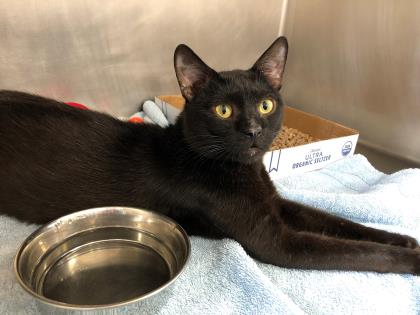Loki is a one year old male domestic short-hair. He loves to play.
Loki was relinquished to the animal shelter because his owner had too many pets.
To make him a part of your forever home contact Frederick County Animal Control 301-600-1546.

Loki is a one year old male domestic short-hair. He loves to play.
Loki was relinquished to the animal shelter because his owner had too many pets.
To make him a part of your forever home contact Frederick County Animal Control 301-600-1546.

Tomatoes have been called a super food for their many vitamins, nutrients, and health benefits. Many people consider tomatoes to be delicious, but do you consider a tomato to be a fruit or a vegetable?
Well, botanically, a fruit is defined as the part that develops from the fertilized ovary of a flower. Vegetables, on the other hand, are the edible parts of plants that aren’t fruits. So, by definition, tomatoes are fruits.
But botanists don’t necessarily have the last word. In 1893, the Supreme Court had to decide whether a tomato was a fruit or a vegetable after a produce importer incurred a 10% import tax on vegetables coming into New York’s Port Authority (which fruits didn’t get at that time). The importer argued for the botanical definition, but the judges disagreed, ruling that in the “common language of the people, whether sellers or consumers”, the tomato was a vegetable.
Nutritionists, in particular, like to categorize the tomato as a vegetable since it has hardly any fructose (a type of sugar), which is present in many fruits like apples & bananas. Meanwhile, due to their sweetness, fruits are also commonly classified by their ability to be incorporated into desserts (which is why we have apple pie & not Brussel sprout pie).
So, is the tomato a fruit? Botanically, yes. Nutritionally, no. And, if you’d prefer to stick with the legal definition, the tomato is not a fruit, but a vegetable. But it might also all come down to where you live: in 2003, Tennessee made the tomato the official state fruit, while New Jersey officially named the tomato as the official state vegetable in 2005. And then, there’s Arkansas, which played both sides of the fence when it declared the tomato as both the state fruit & the state vegetable.
Bottom line: the humble-yet-versatile tomato can be whatever you want it to be.
Got a Mundane Mystery you’d like solved? Send me a message via Twitter (@AndyWebbRadio), or shoot me an email at [email protected].
(Presented by Frederick Brick Works & Putman Plumbing)
Cancellations and Delays:
(Presented by Advanced Automotive Repair & Frederick Brick Works)
As we prepare to “ring in” the New Year with all sorts of revelries, like toasts, kisses, New Year’s resolutions, movie marathons, and more…have you ever wondered why none of those things ring? So why do say we’re going to “ring in” the New Year?
Back when the phrase first originated, it actually involved things that did/do ring: bells. Communities used to say goodbye to the old year & welcome the new year by ringing bells, most often at churches. The tradition sprang from other occasions where bells marked an end, like “passing bells” that tolled when someone died, or ones that celebrated a beginning (such as “wedding bells”).
Long before throngs of revelers first began filling Times Square to watch the ball drop in 1907, celebrants congregated a bit further downtown at Trinity Church on Wall Street, where they really did “ring in” the New Year with a full-blown concert by the church’s official bell ringer, who played hits of the day like ‘Hail Columbia,’ ‘Yankee Doodle’ and selections from the opera “La Fille du Regiment”. The earliest mention of the tradition, according to Trinity Church’s archives, is from the minutes of a meeting in 1801 where congregants agreed to pay eight pounds to “the Persons who rang the Bells on New Year’s Day.” It’s very possible that it could’ve been going on way before then, since the church got its first bell back in 1698.
Basically, ringing bells was, at one time, one of the primary components of the New Year’s holiday. But it’s faded from memory, and now “ring in the New Year” just doesn’t make as much sense to folks who don’t know the term’s history (which could explain why so many people now say “bring in the New Year” instead).
However YOU “ring in the New Year”, be sure to send the Mundane Mysteries you’d like solved to me via Twitter (@AndyWebbRadio), or by emailing [email protected]!
BROUGHT TO YOU BY: Airtron Heating & Air Conditioning